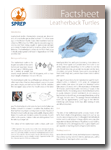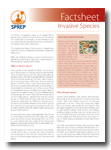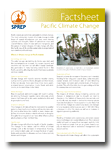| |
About
SPREP Factsheets
SPREP
Factsheets are background papers on key environment issues of interest
to the Pacific region. Each is designed to provide a basic introduction
to the topic at hand as a starting point for a general audience.
Each
factsheet is available for download in PDF format designed for desktop
printing on A4 paper (US letter users should choose "scale to
fit" from the print options).
We
welcome your comments for improvement as well as suggestions for
future titles.
Please
check back often for new releases in the series.
|
| By
date of release/update |
IE-005:
Pacific Wetlands Conservation (updated January
2009)
Issued in connection with World Wetlands Day, this fact
sheet examines what constitutes a wetland, the types of wetlands
commonly found in the Pacific and how the Ramsar Convention
on Wetlands
and
SPREP
have teamed to protect and preserve these valuable ecosystems.
Additional background is provided on the Convention and World
Wetlands Day.
|
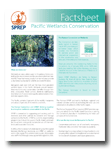 |
|
IE-004:
Mangroves in the Pacific (updated January 2009)
Mangroves play
an essential role in many coastal environments throughout the Pacific.
This fact sheet looks at what they are, where they are found in the Pacific,
why they are important, the threats they face and what we can do to protect.
|
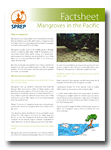 |
|
PF-004:
Plastic Bags (updated November 2008)
More than a billion single-use plastic bags are given out freely each day.
While they may be free at the shops, they are costing our earth in many
ways. This fact sheet examines the real costs associated with plastic bags,
looks at biodegradable alternatives, and identifies some
ways
in which we can lessen our environmental imprint through minimising or eliminating
our plastic bag use.
|
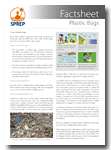 |
|
IE-003:
Leatherback Turtles (October 2008)
Populations of Leatherback turtles (Dermochelys coriacea) have
declined by 95% in the Western Pacific since the 1980s. This fact sheet
examines the reasons for the decline, the nature of the continuing
threats they face, and conservation measures underway. It also provides
background on leatherback biology and
ecology,
diet, nesting locations,
migration and behaviour.
|
|
|
IE-002:
Invasive Species (updated October 2008)
The Pacific islands have high numbers of endemic species. The population
of many of these species is naturally very small, making them extremely
vulnerable to disturbance. Invasive species pose perhaps the greatest
risk to island ecosystems and biodiversity. This fact sheet outlines
what they are, how they spread, and what we can do about them.
|
|
|
WC-001:
The Waigani Convention (updated August 2008)
The Waigani Convention is the Pacific regional treaty regulating hazardous
and radioactive wastes. This fact sheet provides background information
on the Convention's history, parties, purposes, obligations, costs and
benefits to Parties as well as SPREP's support activities and the Convention's
place within the international hazardous waste control regime.
|
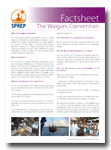
|
|
PF-003:
Climate Change and the Pacific (August 2008)
Pacific islands are extremely vulnerable to climate change. The most
substantial impacts of climate change include losses of coastal infrastructure
and land, more intense cyclones and droughts, failure of subsistence
crops and coastal fisheries, losses of coral reefs and mangroves, and
the spread of certain diseases. This fact sheet looks at some of the
ways climate change will affect the Pacific way of life and the sustainable
development of our islands.
|
|
|
PF-002:
Aquatic Invasive Species (August 2008)
Marine invasive species, specifically those spread by ship ballast water,
are a growing concern throughout the region. This fact sheet covers how
these organisms are spread, specific tips on reducing transmission from
ballast water, and identifies some of the primary species of international
concern.
|
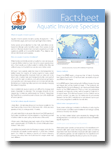
|
|
PF-001:
Reducing Solid Waste (July 2008)
With landfill space at a premium and environmental hazards inherent to
most disposal methods, solid waste is a problem that is here in the Pacific
to stay. This factsheet looks at ways each of us can reduce our generation
of waste and how to most effectively dispose, recycle or reuse what we
now throw away.
|
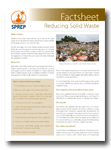
|
|
IE-001:
Turtle Tagging (June 2008)
Information on SPREP's turtle tagging programme, including sections on
why SPREP tags turtles, what information is gained from tagging, types
and methods of tagging, what to do if you find a tagged turtle, lessons
learned from turtles tagged in the past, and information about the Turtle
Research and Monitoring Sysetem (TREDS).
|
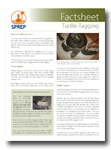
|
|
CS-001:
About SPREP (May 2008)
Background information on SPREP and its vision, mandate, guiding principles,
programmes, fields of work, staffing, funding and membership. |
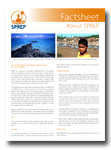
|
|
By theme
Climate
change
Conventions
Institutions
Invasive
species
Marine
turtles
Pollution
and waste
Wetlands
|




